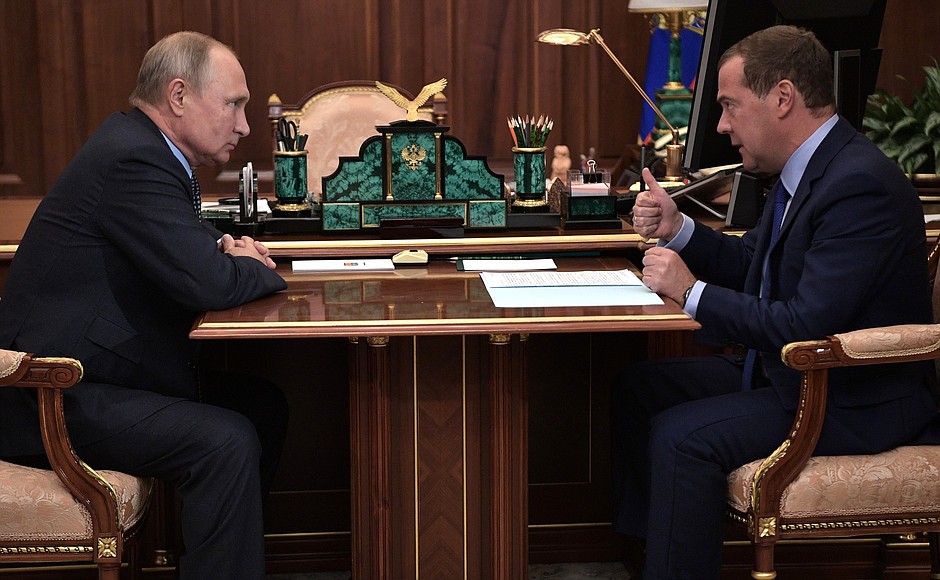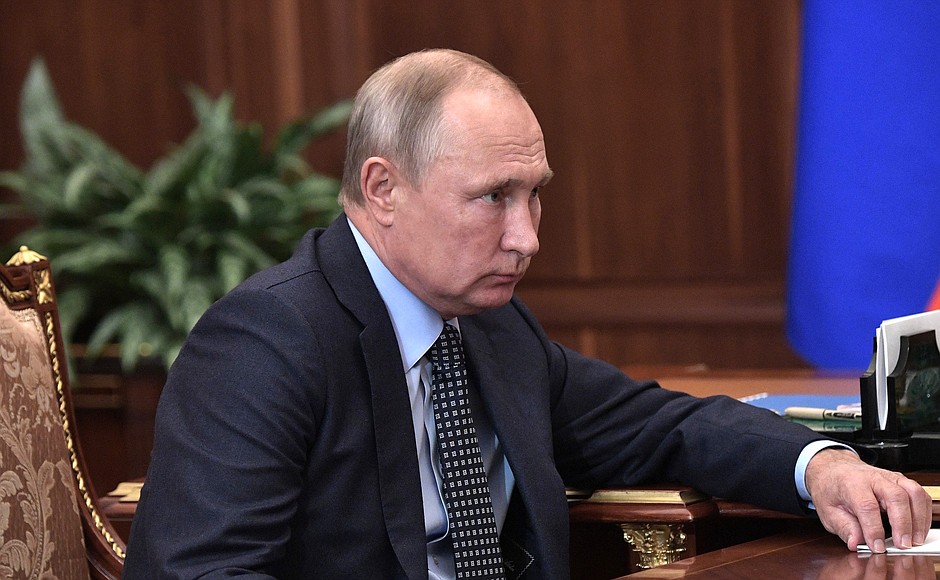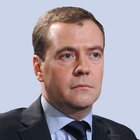President of Russia Vladimir Putin: Mr Medvedev, as far as I understand, the Government has completed extensive and, as usual, complicated work to coordinate the budget parameters for next year and the next three years in general.
Prime Minister Dmitry Medvedev: Yes, we have, Mr President. I would like to report that last week we examined a large budget package. It includes a prognosis on socioeconomic development, the main areas of the budget, tax and tariff policies, and budgets of the state extra-budgetary funds, such as the Compulsory Health Insurance Fund, the Pension Fund and the Social Insurance Fund. The Bank of Russia presented the main areas of the unified state monetary policy.
Of course, we discussed the most fundamental document: the draft budget for 2020 and the 2021–2022 planning periods. Its main parameters were presented at a Government meeting. The budget will not only be balanced, but will have a surplus in all the three years to come.
When drafting the budget, we proceeded from the budget rule. The National Wealth Fund now exceeds seven percent of the GDP, and, according to our estimations, this tendency will remain in the near future. In this sense, we have a good factor of safety.
The budget is the main tool to achieve the national development goals envisaged in the Presidential Executive Order signed on May 7, 2018, and, of course, addresses above all the tasks of improving the people’s quality of life and Russia’s economic development. As we agreed, the Government finances these areas as a matter of priority.
In total, over the three years, I mean 2020, 2021 and 2022, about seven trillion rubles are to be allocated from the federal budget to implement national projects and the Comprehensive Plan for Upgrading and Expanding Core Infrastructure.
The biggest item of expense is the social sphere. Next year, healthcare expenses will almost double as part of the relevant national projects, totaling 320 billion compared to 160 billion rubles in 2019. Funding of demography and education will increase by almost 20 percent. Funding of science and environmental programmes will grow more than 1.5 times.
Following your Address to the Federal Assembly, starting from 2020 we have laid down new measures that should support the birth rate, aimed at supporting families with children and the sustainable growth of people's incomes. Let me remind you, we are talking about a monthly payment for a child aged between eighteen months and three years – as you said in the Address. Secondly, there is a change in the elegibility criteria when assigning monthly payments from one and a half to two times the minimum subsistence level. And there will be a monthly payment for a third child and subsequent children in the regions of the Urals and Siberian federal districts, since special support measures are required there.
Therefore, considerable funds have been invested in the implementation of national economic projects, in the expansion and update of infrastructure, in repairs, road construction, in the development of small and medium-sized enterprises, in support of exports, in raising labour productivity, and in all other areas that arise from national projects.
We have been separately engaged in and will be ready to report on proposals aimed at improving the quality of primary healthcare.
Vladimir Putin: Mr Medvedev, you and I are well aware that the state budget is the most important tool for achieving national development goals and the cornerstone of our entire monetary policy, which is clearly resulting in a stable macroeconomic situation in Russia. So I hope that, as the budget is reviewed by the State Duma, its basic elements will not be lost, but on the contrary, will be implemented in the best possible way with the proposals that the lower house deputies can make during discussions with the Government.
One more request concerning the adoption of this main financial document, the main financial law of the country in the coming years: I would like us to focus not only on financing expenditure as such (I hope this will be implemented), but on reducing the bureaucratic formalities in decision-making, so as to ensure more fluid funding.
Even this year, unfortunately, it is not working out the way we originally planned, smoothly and evenly on a quarterly basis – due, among other things, to objective circumstances and prior decisions.
But it is my strong conviction that, if we really want to implement these National Projects we have been working on for so long together, we need to change our practices to ensure the regularity of financing of the development goals we have set.
Dmitry Medvedev: We will do so. We will deal with just this kind of bureaucracy that encumbers the rules for delivering financial resources.
Vladimir Putin: Good.
<…>


